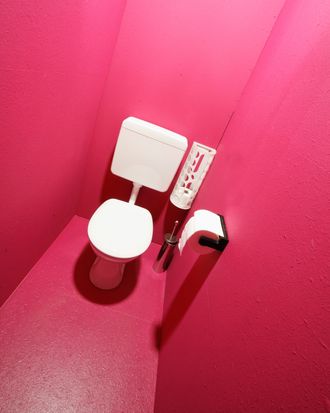
Many women’s periods are accompanied by a lot of poop, an alarming lack of poop, or, in some kind of cruel joke, alternating segments of both. Each of these scenarios is concerning, and we can’t blame you if you’ve consulted Dr. Google. We investigated: Is this normal?
Let’s talk about what happens before your period. Levels of the hormone progesterone peak around the midpoint of your cycle and fall sharply afterward. The hormone affects the functioning of smooth muscle, which is found in hollow internal organs like the intestines and uterus, says Scott Sullivan, M.D., F.A.C.O.G., associate professor of obstetrics and gynecology, and the director of maternal-fetal medicine at the Medical University of South Carolina in Charleston. When progesterone is high, women are more likely to be constipated, and when it’s low, they can experience cramps and contractions, both uterine and intestinal, which means more pooping.
Remember that the bleeding part of your period is the lining of your uterus sloughing off. That lining has been accumulating more and more inflammatory building blocks, so that by days 26 to 28 of the cycle, women feel swollen and sore, says Dr. Sullivan, who also serves on the ethics committee of the American Congress of Obstetricians and Gynecologists. These inflammatory precursors also get your bowel all riled up. “Its response to inflammation is to contract, to be more active, essentially, which is why people feel crampy and gassy and are more prone to diarrhea.” Great. But it’s not the same for everyone, he says: “For some people I’ve seen it’s only 48 hours around day 27 and 28; for other people it can be a full seven to ten days before, which is really lousy.”
Women taking oral contraceptives may avoid some of these symptoms because the Pill essentially provides a steady dose of estrogen and progestin (synthetic progesterone) throughout the month, without any big hormonal swings. But some women still experience GI distress during the placebo week, as that’s when the Pills are hormone-free.
Understandably, not everyone volunteers this info during their annual gyno visit, but Dr. Sullivan suggests checking your embarrassment at the door. (Hell, you’re going to strip down anyway.) “The doctors want to know. We ask a lot of questions, but let’s be honest, in modern medicine, time is a premium. The best thing any patient can do, with these symptoms or any symptoms, is to make a list of questions.”
Dr. Sullivan says “plain old, boring” non-steroidal anti-inflammatories like Motrin, Aleve, and Advil help relieve a lot of his patients’ GI symptoms; conveniently, they also reduce bleeding and uterine cramping. Diet also plays a role here — and can be tweaked accordingly. If you’re going more than usual, it could be because you’re eating things you think will make you feel better (shout-out to fatty foods), when in reality they can set off bowel problems. Dr. Sullivan suggests trying to learn your triggers, since a bit of prevention can be better than treating the symptoms. If, on the other hand, you can’t go for several days, he recommends eating more fiber-rich foods, drinking more water, or taking bulking agents like Metamucil or osmotic laxatives like Miralax. Stronger laxatives aren’t worth it in this case, he says, since it’s likely a short-term problem.
You can certainly try these remedies on your own, but if your symptoms aren’t going away — or they’re not limited to the days around your period — it’s important to tell your doctor what’s going on. You should definitely speak up if your pain is so bad it doubles you over, you see blood in your stool, you have unexplained weight loss, or you feel full very quickly when eating.
“Whether it’s questions about their GI tract or questions about sex, a good doctor is going to be open and nonjudgmental,” Dr. Sullivan says. “They’ll listen and they’ll try to help, whether that’s giving reassurance, telling you to try X or Y, or saying ‘That’s not so normal and we should do more tests.’”




